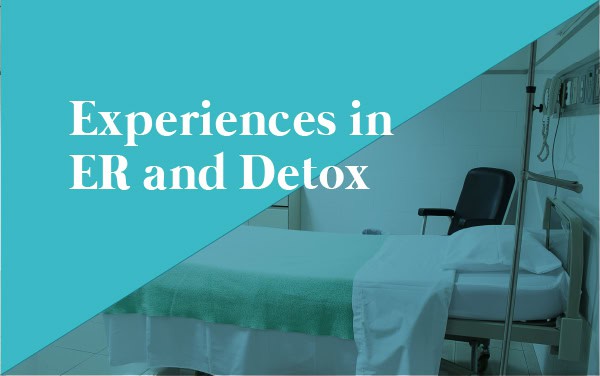
by RE Helper | Sep 15, 2024 | Alcohol Relapse, Blog, Early Sobriety, Science and alcohol, Uncategorized
Today’s blog entry is from Dan B. Dan has been a member of Café RE since January 2022. He can be found on our zoom chats and supporting fellow members of Café RE.
Experiences in the ER and Detox
By: Dan B (Café RE UP)
Both are Brutal & Dangerous: Drinking to that Level and Detox/Withdrawal by Dan B.
I’m hoping that all my experiences in ER and Detox could both be informative and a motivation not to do what I did. I used to drink enough alcohol in a binge over days to the point I was in a panic and my blood alcohol level was at a dangerous level. Alcohol energized me, raised adrenaline and cortisol, then I probably used more for hair of the dog, and for fear of withdrawal – so it all accumulated to a dangerous level, hence ambulance rides (way too many) initiated by my friend or myself seeking a friend or neighbor.
ER Experiences
In the ER, I usually asked for a benzo like Ativan, because I felt in a panic, but at a certain blood alcohol level, they cannot give you it. One time, I think they waited until my BAC was under 2.5; another time, they didn’t give me anything at all. I think I believed I was in withdrawal, but it was intoxication. Having an anxiety disorder probably factors into this.
They hook you up to IV, and put those round stickers on you, is that for heart eval? I should know by now. I think they had something on my other arm sometimes too. Sometimes they told me to keep my arm straight. One time they told me not to move. In some situations, if I got out of my bed, beeps would go off; other times, they didn’t. I was in telemetry at times, which I guess may be extra monitoring.
Various staff would come in at different times to take vitals and such. Nice, caring nurses make a huge difference in states like these. And I always thank them. They would also do a certain scan putting me into a machine, maybe because I sometimes fell before going in. I was often what they call a fall risk, so that’s why they wanted me to stay in bed.
At certain visits, they would attach something for urination. Others I would have that plastic bottle. When I had some anxious energy, I liked to walk around, but they are extremely attentive when you step an inch outside of your door.
I usually asked for a lot of water, but I think at one visit, they didn’t want me drinking too much because I guess it may eliminate some of the electrolytes via IV.
The “Fight” Out
They eventually have a counselor evaluate me via computer, in which she asks at least 30 questions. Between that and a doctor’s call, that determines if they will keep you in for days, transferred to detox. I’ve been there several times, and it’s a process just to get out.
So, in a very challenged, exhausted state, I gave my best to speak well and answer questions the right way. Because I know the decision is ultimately mine about drinking. And when you are in detox for days, you have access to nothing in terms of phone, shaving, makeup, etc. You are in scrubs. In the process of discharge, they will ask if you have support. I always said, “Oh I’m in an amazing recovery group called Café RE.
I usually have nothing in terms of glasses, my wallet, phone, keys. So there was a fear that my doors would be locked though I leave the sliding glass door unlocked a lot. They call a ride for you, and I often left in scrubs and socks. I hated going back because my neighbor often knew about the episode and is very nosy.
When Transferred to Detox (5-9 Days)
I was always pleased when I had my own room in detox, because you never know what your roommate will be like. In NJ, I had a roommate that said, “If you snore – I’m going to put toothpaste up your nose.” I stayed awake as long as possible.
Some of the hospitals for detox were very challenging environments, but you also create special bonds, and we found a way to laugh together. But it also got pretty “crazy” at times. You also hear some very sad stories. But there are also some good workshops.
Self-Detox
This obviously could be dangerous, especially without a benzo like Librium. When I went through alcohol withdrawal at home without the help of a benzo, even after spending half a day to 2-3 days in the ER, I may have had some alcohol a couple of times. But even with that small amount, the reduction was so significant that I still experienced the full effects of withdrawal. And you also have the possibility to tip back over into dangerous excess.
So, in general, here’s what withdrawal was like when drinking vodka at the massive level I did:
There are various alcohol withdrawal symptoms one can get. The first two days are the scariest. Sometimes I vomited throughout the day, from 2 up to 20 times. The dreams on day 2 and 3 (or similar) were vivid and weird in a scary way. And I’m not one to ever get this unless I’m going through this process. Trying to take vitamins caused me to vomit also. It’s strange because you are very tired but have anxious energy. So as a fall risk, I would lay on the couch and move my legs/feet because of the anxious energy.
I would sleep on my side in case I vomited. You don’t want to sleep on your back during this. I often said, “God, please help me.” Then read Matthew Perry also said that. I often did the heart hold with affirmations like, “Daniel, you are going to be OK.” And did deep breathing. I remember in some episodes, I felt like deep breathing a lot still wasn’t enough.
In one episode, I was trying to hydrate but vomiting as well, so I don’t think I was hydrating. I drank Powerade Zero for electrolytes. I sometimes put on the Insight Timer app which has relaxing sleep music. Sometimes I kept playing “Be Not Afraid”, which my long-time friend did during hard times. He’s one of my smartest, biggest hearted friends.
I was weak walking to the bathroom, and would sometimes hold the rail of the shower. Thank God for Google. I would look up things. When I eventually could hold food and vitamins down, I had blueberries and strawberries out. Perhaps broccoli at times. And of course B1 (Thiamine) and Folic Acid. This is standard in this process. The amount they prescribed me for folic acid was 1 mg, B1 varied from 50-100mg according to the notes I’m looking at from two visits.
After 3 days, things get better. After 5 days even better. And after 7 or 8, for me, it was a major transformation. So, this was my experience with and without alcohol after a binge.
It was brutal.
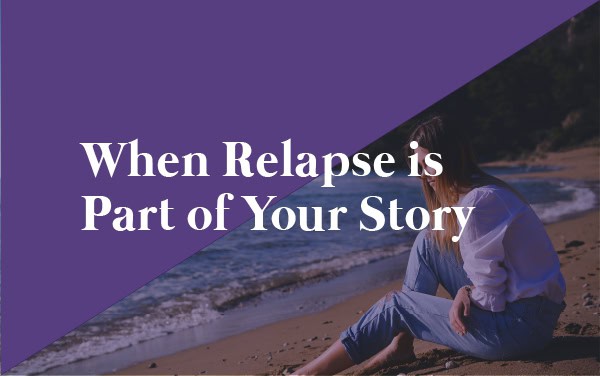
by Kerri MacFarlane | Aug 15, 2021 | Alcohol Relapse, Blog, Early Sobriety, The first Year
I saw the following quote about relapse on Instagram the other day. When I first read it I thought, ‘gross!’, and scrolled on. Throughout the day the quote kept coming back to me though…perhaps because I have 3 dogs that are often doing gross things. But the more I thought about it, the more I agreed with it.
“It is the return of a dog to his vomit.”
― Paul Verlaine
Relapse IS kinda like the return of a dog to his vomit. ?? But it is more than that, much more.
In its simplest terms, a relapse is when you start drinking again after a period of abstinence.
I think relapse is one of the scariest words for people in recovery. But it is also a very normal part of the recovery process…and it does not mean you have failed. If you have listened to the Recovery Elevator podcast or are part of our Café RE community you have probably heard the term ‘field research’. Many of us use that term in place of the word ‘relapse’. Some people, such as Paul Churchill, feel that the word ‘relapse’ is another word in recovery, similar to the word ‘alcoholic’, that needs to be thrown out. Paul talks more about that here.
Alcohol is one of the most commonly ingested substances in the world. The 2019 National Survey on Drug Use and Health found roughly 16 million Americans were heavy alcohol users, and 14.5 million Americans had an alcohol use disorder. Stress, anxiety and isolation caused by the Covid-19 pandemic have worsened these numbers.
Over 30% of people who attempt to stop drinking relapse in their first year of sobriety, but that rate does go down over time. After 5 years that number has dropped to 9.6%. I left out a lot of the statistics, but the bottom line is more than 70% of people struggling with alcohol abuse will relapse at some point.
That doesn’t mean they won’t get back on that wagon and succeed.
I’ve heard people say that the relapse starts way before you actually pick the drink back up, the relapse itself does not occur all at once. I don’t think that anyone plans for, or intends for a relapse to occur. But they do happen, and they happen in stages.
“Stressing about a relapse happening only leads to a release happening.”
― D.C. Hyden
THE STAGES OF RELAPSE
Experts say that relapse occurs in three separate stages — emotional, mental and physical.
- Emotional relapse: The person is not actively drinking or even thinking about drinking, but they are having thought patterns that could possibly be setting them up for a future relapse. This is also where triggers come into play. A trigger could be going to a location where you used to drink, hanging around people you used to drink with, or participating in an activity that you used to drink during.
- Mental relapse: The individual in a mental relapse is waging an internal battle. One part of them wants to remain sober, and the other part wants to drink. Once you have given yourself mental permission to pick up the drink, even for “just this one time”, it can be very difficult to hold on to your sobriety.
- Physical relapse: The individual starts to actively drink alcohol again, often resulting in, and leading up to, previous patterns of alcohol abuse.
A relapse will have you feeling guilty, ashamed and tempted to throw in the towel. But don’t! Use those feelings to get back in the saddle.
That’s what I have done (am currently doing in fact). Will relapse be a part of your story? Maybe. Maybe not. It is, however, a part of mine.
I have had a recent relapse…and it’s not my first. (God willing it will be my last! ??). I have those feelings of guilt, shame, that I’ve failed…myself and everyone else, that I’m not good enough for the people that I surround myself with. But I’m using those feelings…using them to help me do better, be better.
I can’t tell you when my relapse started…because again, it started long before I picked up the bottle. And I also can’t tell you how long it would have continued had I not been called out on my bullshit. What I can tell you is I stopped using the tools in my recovery toolbox. I can tell you I never reached out for support or asked for help…and my support circle is LARGE (something I learned after sharing I had relapsed). I won’t make those mistakes again.
I can also tell you that it feels really good to be sharing with that support circle now. ??
Today I feel good.
IWNDWYT (I will not drink with you today.)
Until next time, be well.
Kerri Mac ??
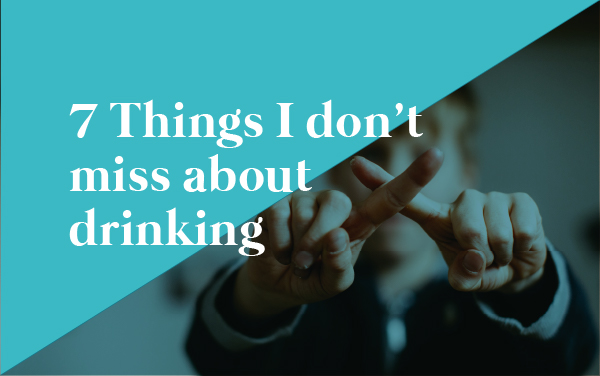
by Kerri MacFarlane | Jun 15, 2021 | Alcohol Relapse, Blog, Early Sobriety, Helpful Tips, The first Year, Uncategorized
There was a time that I was afraid to stop drinking. I was afraid that I would fail. I was scared about removing something from my life that had been a part of my life for over 30 years.
I thought drinking made me fun…so by quitting I would be boring. I would lose friends. Which in hindsight was crazy thinking since I drank at home, alone, for the last 15 or so years. I didn’t have friends…drinking friends or not. Sounds like the opposite of fun to me now.
In the beginning the thought that I would have to be ‘in recovery’ for the rest of my life was depressing and overwhelming. Was I always going to have to work so hard? Was whether or not I was drinking going to be my only real story? I now see recovery as a gift.
I am truly grateful for my recovery and being in recovery. I can now take a step back and list off things that without my recovery I wouldn’t have. Things I’ve gained. Things I’ve regained.
I can also step back and remind myself of the things I don’t miss about drinking. Here’s a few of them.
1️⃣ The hangovers. The bloody hangovers. This is probably the main thing we can all relate to and the first thing that comes to mind when someone asks you what you don’t miss about drinking. Peeling your eyelids open, the pounding headache, nausea, vomiting, dehydration, shakes, lack of energy. There was a time that was my everyday routine. I would either sleep the day away, finally starting to feel human again later in the afternoon…when I would start drinking again. Or I would have a couple shots early in the morning to help get me through the day. My motivation and productivity was at zero. I don’t miss the hangovers.

2️⃣ The blackouts. Waking up and checking my phone in fear…when I could find my phone. Who did I talk to? What did I say and do? Not having a conversation the next day because I very well already had the conversation the night before and don’t remember. Playing detective the next day. I was a blackout drinker from day 1. I don’t miss blacking out.
3️⃣ The anxiety, the shame and regret. 3:00 am was the worst. I would get up and drink…if I could find the bottle I hid…just so I could fall back asleep. I never really thought I had anxiety until I stopped drinking and it went away. I don’t miss not sleeping properly, I have never experienced sleep like I have since I quit drinking alcohol, it really is incredible. I don’t miss the anxiety, the shame and regret.
4️⃣ Apologizing…over and over…again and again. It’s true that action speaks louder than words. But I truly was sorry that I drank, again. I truly was sorry that I said I wouldn’t, but I did. I don’t miss sounding like a broken record with the apologies.

5️⃣ Always thinking about alcohol. I don’t miss thinking about alcohol all the time. Have I got enough? Should I go and get some more? What if it runs out? Is it too early in the morning to go buy more? The mental energy spent when drinking is exhausting. I don’t miss always thinking about alcohol.
6️⃣ The harm to my health and physical appearance. My skin looked like shat. I had bags under my eyes. I looked years older. I ate junk food in excess. I had high blood pressure. I couldn’t sleep. I had no energy. When you’re actively drinking you don’t necessarily realize the toll it’s taking on your body, or you just don’t care. But when you remove alcohol, it becomes pretty obvious how it was affecting you physically. I don’t miss harming my health and good looks. ?
7️⃣ Disappointing the people I love, disappointing myself. Not to say that after ditching the booze I never disappointed the people I love or myself again. Because that is just not true. I am human after all. But I can say I stopped the groundhog days of doing it. And once I was able to let go of the shame I was able to believe that I am not a failure because of my failures. And I was able to start rebuilding relationships…the most important one being the one with myself. I don’t miss repeatedly letting those I love down.
There’s more I could add…but I’ll stop there. I feel the longer I am in recovery the longer my list will get. Some days it is easy. Other days I have to use more of my tools. It’s not saying no to alcohol, it’s saying yes to a better life. And there are wonderful things on the other side…you just have to trust yourself you CAN get there.
But it really is worth it.
Until next time, be well.
Kerri Mac ??
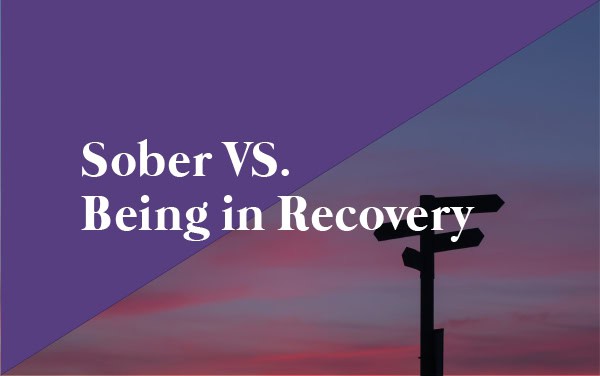
by Kerri MacFarlane | Apr 18, 2021 | Alcohol Relapse, Blog, Early Sobriety, Expectations, The first Year, Uncategorized
“I’m sober.”
“I’m in recovery.”
Two statements that very often get interchanged. If you think they mean the same thing, think again. There is a distinct difference. Being sober is very different from being in recovery. You can be one or the other…or you can be both.
Choose both.
What Is Sobriety?
When you have eliminated alcohol from your life you are deemed “sober,” and although sobriety is part of recovery, sobriety alone is often a temporary and fragile state. Think of the terms “white knuckling it” and “dry drunk”.
White knuckling your sobriety means you are trying to manage your addiction without help. You are using your will power or trying to fix yourself with your mind.
A “dry drunk” is someone who is sober but is struggling with the emotional and psychological issues that led them to have a problem with alcohol in the first place.
Just because you no longer live under the influence of alcohol it doesn’t mean that other unhealthy aspects of your life have changed. For example, you may still have poor or damaged relationships, behavioral health issues, mental health issues, or emotional issues that need to be addressed.
Sobriety is considered to be the natural state of a human being at birth. A person in a state of sobriety is considered sober.
What Is Recovery?
There is no “standard” definition of “recovery” in the addiction community, and part of the reason why is because everyone’s recovery journey is unique. ??
According to SAMHSA, recovery is “a process of change through which people improve their health and wellness, live self-directed lives, and strive to reach their full potential.”
A person in recovery is continually making an effort to work through the issues that caused the alcohol abuse to occur in the first place.
In recovery is a powerful period because beyond everything else, it signifies that you know you have a problem and you are trying to fix it. Recovery allows you to make positive changes and deeply examine your feelings, beliefs and behaviors. Recovery does not mean you fix your issues right away. It means you recognize something is wrong, which is the first step and a critical part of getting help.
People in recovery have the greatest chance of maintaining long-term sobriety. Better yet, they have the opportunity to live a happy and productive life that is free from addiction.
I love this list that Odette shared on the podcast, episode 316…titled the same as this blog…”Sober” VS “In Recovery”.
When you are in Recovery, you:
- Feel a kinship to those who are also in Recovery. (SO true!)
- Make decisions based on how it could impact your Recovery. (“My recovery must come first so that everything I love in life does not have to come last.”)
- Adjust friendships and relationships based on how they could affect Recovery. (BOUNDARIES!!)
- Never let down your guard. (I don’t got this!)
So, can you be sober and not be in recovery? Absolutely! And although you can achieve a state of sobriety with simply abstaining from alcohol, with time, you will come to find that the life you want comes not just from being sober but from entering into the recovery mindset. ?
And you know what the cool thing is? You don’t have to be an alcoholic to live in this mindset. ? The mindset that allows you to grow and develop your self awareness, the mindset that allows you to see beyond the surface and question many things in life like relationships and boundaries. That mindset is for everyone.
Once I got past the early days of sobriety I started thinking of my sobriety journey as my recovery journey. I realized that it was about SO much more than just ditching the booze. That the recovery process is one of ongoing healing and that there is no part of my life that my recovery doesn’t touch.
I also learned that it is rarely accomplished alone. I wanted to be around others ‘in recovery’. Not just because they were sober and could relate to that part of my life. But because they want to grow, want to learn, want to be better.
Transitioning from sobriety to recovery takes both commitment and action.
If you are a grey area drinker or someone who doesn’t even know if they belong here because you are not alcoholic enough…I hope you know that recovery is for EVERYBODY.
E V E R Y B O D Y.
You have your seat at this table, no matter what.
Until next time, be well.
Kerri Mac ??
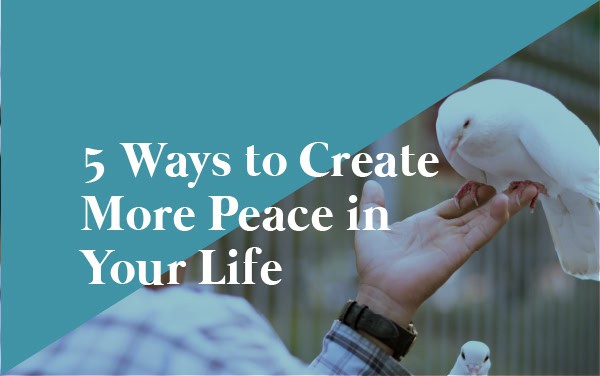
by Kerri MacFarlane | Jan 5, 2021 | Alcohol Relapse, Blog, COVID, Early Sobriety, Helpful Tips, Inner Peace, The first Year
I stopped making New Year Resolutions a few years ago. As positive, excited and motivated they would make me feel at the start of the year…oftentimes those very same resolutions would bring me down later in the year. It wouldn’t be long and I would feel like a failure for not following through. I would start thinking of myself as someone who just abandons their hopes and dreams. “Kerri, you suck.”, would play on repeat in my mind.
Counterproductive, to say the least.
Then a couple years ago, instead of making resolutions, I tried doing what I was seeing a lot of other people do. I would choose a word for the year. The chosen word wasn’t a resolution or a goal. It was more like a prayer or mantra, and I used it to help guide me in the daily actions and decisions (both large and small) I had to make. It was as if the word was a lighthouse helping to show me the way to a better version of myself.
As 2020 was coming to an end I started thinking about what my word for 2021 would be. I took me a little longer than it had in the previous years to decide on one. 2020 was strange, scary, hard, filled with uncertainty, unfamiliarity and loss. I kept hearing and reading posts and comments from people that just couldn’t wait to move past 2020, that it was a year they wanted to forget. Sorry to burst your bubble if you are in that camp…2020 is a year that will never be forgotten.
For me, if I were to pick a word to describe 2020 it would be WEIRD. And that was ALMOST going to be my word for 2021. Maybe that will be next year’s word. ?
This year my word is PEACE. ? 
Remember…this word is like a prayer or a mantra…I am using it to guide me. I want to create more peace in my life. I want to be more at peace with myself. It doesn’t mean I can just sit back, chant ‘peace’ over and over…and everything will change. I still have to do the work. Below are some of the things that I’m doing to help create and bring more PEACE into my life.
- Clear the clutter! Unclutter your living space, your work space, your mind. Ask yourself, does it bring you peace? If the answer ISN’T a HARD YES…then…get…rid…of…it! If it’s not serving you…get…rid…of…it! Clutter in your physical space, and in your mental space, creates chaos. Chaos is the opposite of peace. That is not what we want my friends.
I cleaned out my pantry and found spices that expired in 2003!! If it’s old and expired…get…rid…of…it!
2. Relax. Find a relaxation technique that works for you. A way to release and to recharge. It could be meditation, breathwork, long walks, yoga, running, music. For me it’s meditation, music and dancing…first thing in the morning. Find what works and do it.
3. Gratitude Changes Everything Every week during 2020 a dear friend of mine wrote down 1 good thing that had happened that week. She wrote it on a little strip of paper and tossed it in a jar. On New Years she read all those little strips of paper. I thought…what a cool idea! She admits that some weeks it was hard to come up with something. I mean think about it…we just lived through our first pandemic. I think that makes the exercise that much more powerful. Find something to be grateful for every week (I challenge you to do it daily.). I’m already looking forward to reading all my weekly strips of paper on New Years 2022!
4. Follow Your Bliss Before you can follow your bliss…you need to know your bliss. What makes you happy? Brings you joy? Brings you PEACE? Listen to your inner guide and take action on what brings happiness and joy into your life. The door to peace and contentment will open. My recent houseplant hobby is opening that door for me.
5. These things here could all be listed all on their own…but I wanted to give you more things you can start doing today to bring inner peace into your life.
- Set limits, boundaries
- Accept and let go
- Slow down
- Be 10 minutes early so you don’t have to rush
- Instead of guessing…ask, we are not mind readers
- Get outside
- Escape for a while – read a book, binge on Netflix
- Disconnect – screens off
- Laugh ?
Start with one thing and build on it over time. You can do this. We can do this.
“It isn’t enough to talk about peace. One must believe in it. And it isn’t enough to believe in it. One must work at it.” —Eleanor Roosevelt
Wishing you more happiness and PEACE.☮️
Until next time, be well.
Kerri Mac ??
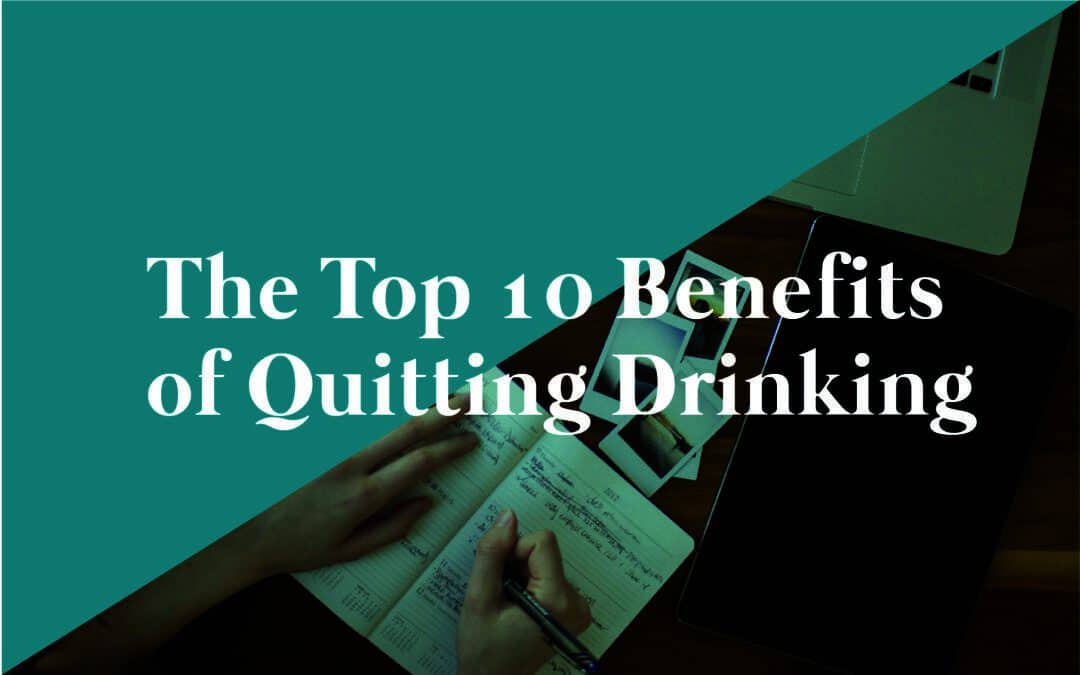
by Kerri MacFarlane | Sep 18, 2020 | Alcohol Relapse, Blog, Early Sobriety, Helpful Tips, Resources, The first Year
?? Hi, my name is Kerri Mac. Some of you may know me, but I’m betting that most of you don’t. I want to thank you for taking the time to read my blog, my very first blog.
How did I end up here, writing a blog for Recovery Elevator? Well, I like to think of it as though I graduated. Two years ago I started writing the show notes for the podcast. And now, here I am…writing blogs. I have been a member of Café RE for over 2.5 years and that has changed my life. But that’s enough about me, for now. ?
I want to talk about the benefits of quitting drinking. And not the obvious ones, like the health benefits or the money and calories saved. No, I want to go a little deeper, and more niche…and I want to make a list…because who doesn’t like a list?
Let’s call our list, The Top 10 Benefits of Quitting Drinking. Catchy, right?!
Here we go…
1 – Your authentic self will begin to emerge. I say begin, because this isn’t a one and done thing, and it takes time. That’s what recovery is, recovering the person you were meant to be and giving the inner child permission to come out and play again. This authentic self fully recognizes that the mind makes life out to be way more serious than it actually is. In fact, don’t forget Rule 22, lighten up and never take yourself too seriously. When you ditch the booze there’s a good chance you’ll find yourself rolling sideways down grassy hills.
2 – You’ll have the chance, the opportunity, to find out why you’re using alcohol to dull that internal discomfort. We’re talking about getting at the roots of this discomfort. No quick fixes or fads, but doing some serious soul work where we make that long journey from living in the head to the heart. This one isn’t so much a benefit, but a life mission and why we’re here.
3 – You’ll begin to find out who you aren’t. Ahhh, you thought I was going to say find out who you are, didn’t you? Nope. And in terms of finding out who you are, I encourage you to rid yourself of this lifelong pursuit because when we quit drinking, the opposite happens. We find out who we are by a series of finding out who we aren’t. Do you dig? Does that make sense? The “who we are” will organically be uncovered by a sequence of revelations of who we aren’t. For example, I’m not a girl who likes to stay up until 2 am and sleep in late, quiet early mornings are my favorite. It’s more common, than not, to find me awake at 4:00 AM…journaling or meditating. You’ll learn you’re a strong person, deeply rooted in this world, who doesn’t need an external substance to feel good internally. Those days will be gone. Hasta la vista, baby! ✌?
4 – You’re open to signs from the universe. Whether you believe they are coming from God, Allah, galaxies, the willow tree in your front yard, or your neighbor Tim, you won’t miss them because you’re drunk or hungover the next day. Hooray! ??♀️??♀️
5- You can see the insanity of the mind. The Hindus called the natural dysfunction of the mind Dukkha, Buddhists call it maya and Christians call it original sin. You’ll also be able to take a step back, become the observer of the mind, and recognize this insanity. Here is what you’ll be able to see. Studies also show that of the 60,000 – 70,000 thoughts we have a day, 90% of them are equal or the same as the day before. ?
-
- It’s these repetitive thoughts that always drive you to make the same decisions.
- It’s these familiar decisions that always lead to the same actions.
- It’s these familiar actions that always result in the same outcomes
- It’s these same outcomes that constantly result in the same emotions
- And these familiar emotions give you those familiar feelings.
- And it’s these feelings that always lead to the same thoughts – thereby completing the cycle. You can now recognize this and will be empowered to change your thinking.
6- Your brain will start to produce regular amounts of Melatonin again. Melatonin is produced by the pineal gland in the brain and simply lets your body know that it is night-time so you can relax and fall asleep. There’s an important word in there. It helps us RELAX when our outer environment says it’s time to relax. Studies show that regular alcohol intake drastically reduces the amount of natural melatonin the body produces which, as you can imagine, does a number on your sleep! ?
7 – Welcome back Oxytocin, or the connection molecule. Oxytocin is produced in the hypothalamus and is sometimes referred to as the “love hormone” because levels of oxytocin increase during hugging and orgasm. It may also have benefits as a treatment for a number of conditions, including depression, anxiety and intestinal problems. This is the molecule that allows us to build altruistic relationships with other human beings. When oxytocin is present in the body, we are living more in the heart area and less in the thinking mind. Studies show that pregnant women who have higher levels of oxytocin bond more strongly with their babies after they are born according to a 2007 study in the journal Psychological Science.
8 – You’re part of something MUCH bigger. We all want to feel like we’re contributing to something, that we are adding to a project or goal and making this world a better place. People are ditching the booze more than ever these days and this global movement takes warriors like you. The bigger picture is that we are no longer looking externally for inner comfort. That’s really what is taking place, and you’re a big part of raising the consciousness on the planet. In fact, when we struggle with addiction we think we are in the back of the line in terms of success and achievement, but in reality, we are the ones who are forced to look within and make HUGE life changes. We are paving the way for others.
9 – You stop hoping. Yep, hope is the problem. When we are hoping for something to change, be it our inner emotional state, the weather, or whatever…then we stop denying what is. This incessant hoping for something to be different drives addiction and is doing a number on humanity. The Buddha noticed this 2500 years ago in Lumbini, now modern day Nepal, when he links all human suffering to craving or hoping for something to be different. That guy was so far ahead of his time.
10 – You’ve got a chance to work on the one big lesson you signed up for in this lifetime. There’s a theory that you’re supposed to work on one major issue in this lifetime. Mine is connection. For others this can be letting things go, loving yourself, standing up for yourself, showing unconditional love to others, forgiveness, self-sabotage, facing fear, patience, shame, regret, and the list goes on. When our veins are flowing with alcohol, there’s no chance we’ll build the internal circuits around these issues. And there’s another theory, that if we don’t get to it in this lifetime, then well, you’ll start again next life. So why not get started now and start tackling the number one thing that is holding us back.
These types of lists are hard. It could easily be the top 100 benefits of sobriety. I challenge you to create your own list and then another one when you hit another milestone. Go back and see how they have changed. The first time I did a list like this, most of mine were external, now they are mostly internal. We are constantly evolving and changing as we walk this journey.
Until next time, be well.
KMac ??











